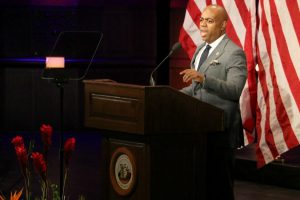Patrick Wall and Sarah D. Sparks argue the different sides of the Newark charter school debate. The expansion of charter schools in Newark, under the guidance of the state, is one of the leading causes to the problem of school closures within Newark Public Schools. However, there are many questions that need to be answered within this debate. Have closures of underachieving schools, helped improve Newark’s academic performance? How can Newark reignite its Public School system under the current circumstances? The articles discussed below offer two different opinions on the issue at hand and give the perspective from both sides of the argument as to why there should or should not be an expansion of charter schools in Newark. The articles to be discussed are by Sarah D. Sparks (2017) and Patrick Wall (2018) and were published in Education Week and Chalkbeat, respectively.
Sparks (2017) discusses recent economic research on the performance of Newark Schools. This research is conducted on a five-year performance period after Newark, under the leadership of former Mayor Corey Booker, pushed for school reform after a $200 million donation from the Zuckerberg-Chan Initiative. As Sparks (2017) notes, this reform “closed and reconstituted schools, expanded the district’s charter sector, and launched a universal enrollment that allowed parents to apply to most district and charter schools.”
Further, Sparks (2017) using data from the study notes that growth rates in math, as well as reading declined in the first year of reform, but rebounded by 2016 “Newark students showed significantly higher growth than the state average.” Sparks sees the positive in the growth of charter schools in Newark using recent economic findings, as she takes a more quantitative rather than qualitative approach towards the controversy.
On the qualitative side, Patrick Wall (2018) analyzes recent discussion by Newark Mayor Ras Baraka to argue the opposite of Sparks (2017). Mayor Baraka recently stated that the charter school sector growth could “suck the life out of traditional schools” (Wall, 2018). One of the crucial aspects Wall discusses is the loss of revenue going towards the Newark Public School, as the proportion of students going to charter schools continues to increase.

Mayor Ras Baraka. Source: https://www.chalkbeat.org/posts/newark/2018/03/30/its-enough-now-mayor-baraka-calls-on-state-to-halt-newarks-charter-school-expansion/
“This year, the district will transfer about a quarter of its budget- roughly $237 million – to charter schools” (Wall). This statistic presented by Wall is the reason why leaders, such as Mayor Baraka are so concerned with charter school growth. Even if there are positive returns to a charter school education, there are significant funds being taken away from public education, increasing the debate on the matter.
Both Wall (2018) and Sparks (2017) present basic outlines to both sides of the argument. After an initial period of negative growth, there is currently research leading towards positive educational gains made by students in charter schools. However, the trade-off to this is that public schools in Newark continue to manage their funds and are struggling to keep their students. There have been numerous closures with little to make up for it. It is important to understand both sides of the issue, which have been provided by these authors.
